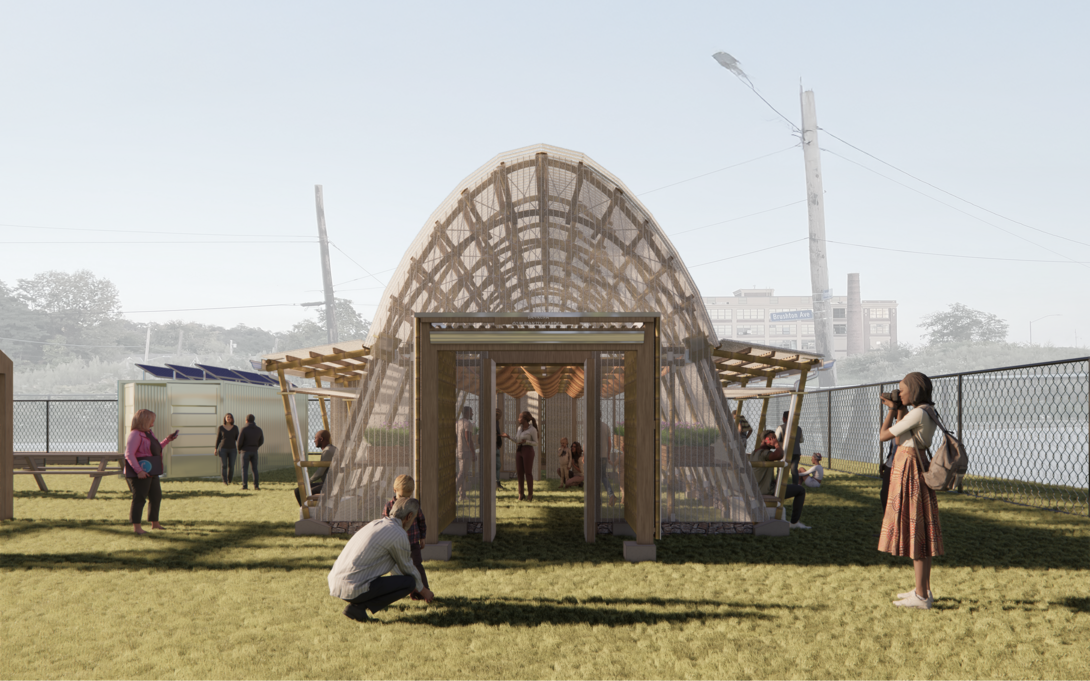PJ Dick Innovation Fund Project Grant: Second Life: From Waste to Oasis

Second Life: From Waste to Oasis
Vicky Achnani, Associate Studio Professor, Carnegie Mellon Architecture
Misri Patel, Ann Kalla Visiting Professor, Carnegie Mellon Architecture
In this epoch of the Anthropocene, both the practice and education of architecture demand bold experimentation, new directions and tangible demonstrations. In these tumultuous times, our communities require our intervention more than ever – particularly in the wake of social unrest and the lingering consequences of the pandemic. Current modes of architectural practice, driven by the relentless use of carbon-intensive materials and solitary work environments, are proving not only unsustainable but perilous. The present moment urgently compels us to cultivate resilient communities, forge alternative local economies, and challenge architectural education to embrace circularity and upcycling.
This innovative project emerges as a beacon of hope in the face of the climate crisis, repurposing bamboo from the previous NOMAS Spring Carnival Pavilion. It seeks to present a compelling case for low-carbon practices through a full-scale intervention within an underserved neighborhood, thus supporting the community while fostering sustainable development. The creation of a bamboo greenhouse/classroom addresses food apartheid, simultaneously providing a vital resource to locals and immersing students in the nuances of participatory design-build and community engagement. In this unorthodox classroom, students are afforded a profound understanding of the site’s subtleties, the inherent properties of materials, and the intricacies of the design-build process.
The project seeks to promote and catalyze environmentally conscious design practices by showcasing the immense potential of the waste economy and low-carbon materials. By harnessing bamboo's natural porosity, flexibility and acoustic absorption properties, the research aims to reduce waste and promote sustainable solutions. At its core, the initiative directly addresses pressing issues of climate change and social justice, fostering a proactive and impactful approach to these global challenges.
The multifaceted process of designing, prototyping, acoustic and load testing, securing permits, detailing systems, and responding to a live brief on-site is a meticulous endeavor that broadens the scope of architectural education. This hands-on engagement with bamboo, repurposing materials, direct community collaboration, and an emphasis on a more intuitive, responsive form of architectural pedagogy aligns seamlessly with the evolving goals of Carnegie Mellon Architecture. In doing so, it redefines architectural education as more impactful, experiential and intimately connected to the societal needs of our time.
Image: Student's work. Render by Michael Bi.
About the Project Lead
Associate Studio Professor
-
Established in 2023 by PJ Dick Trumbull Lindy Group, the Faculty Grants Program will award a total of $400,000 over four years beginning in 2024. The program supports faculty research and teaching innovations that address the School’s three pedagogical challenges of climate change, social justice and artificial intelligence. The proposals were assessed on their impact in furthering a faculty member’s research and teaching, their contribution to interrogating the School’s challenges, and their viability to garner further research support, make an impact on the discipline and expand the pedagogy of the School.
